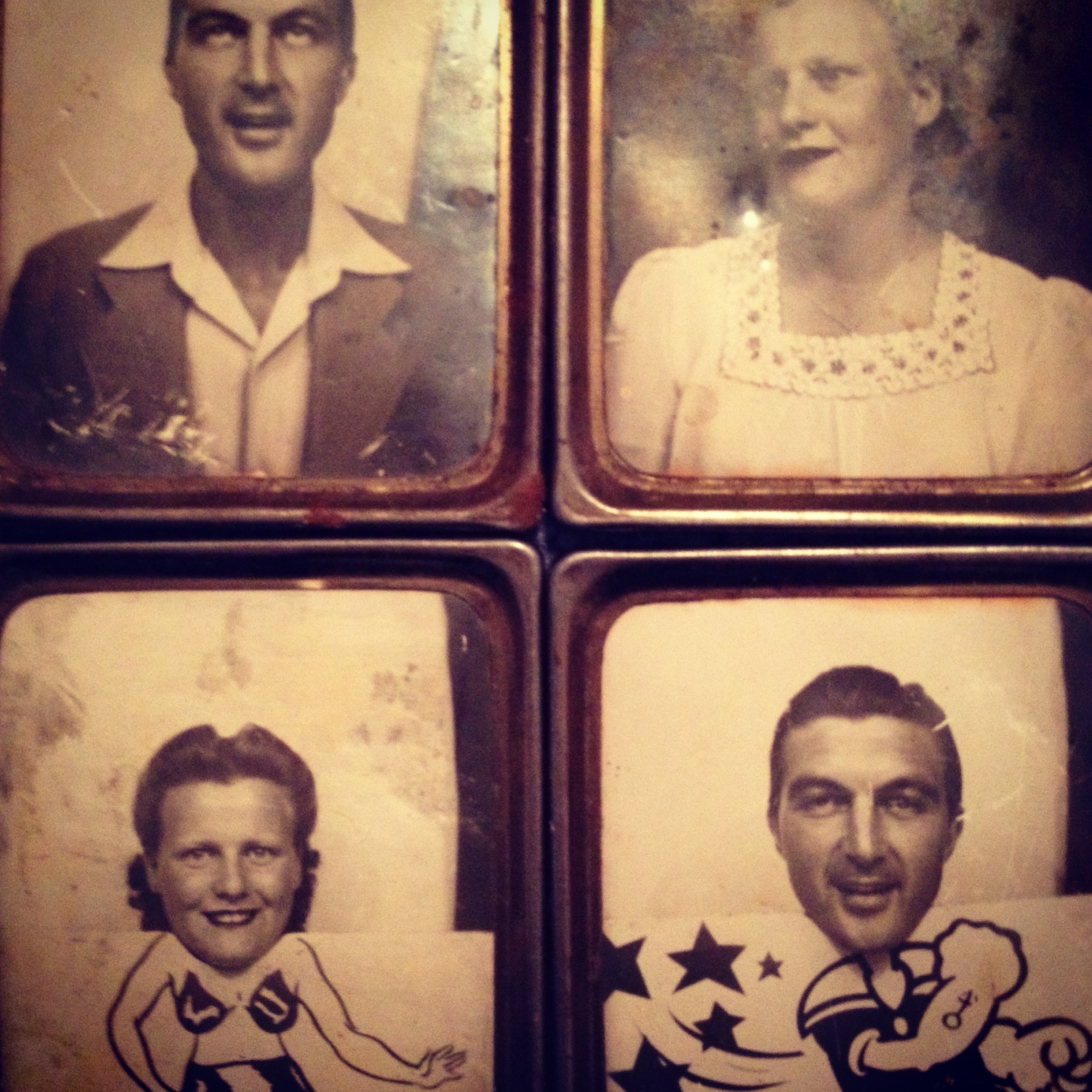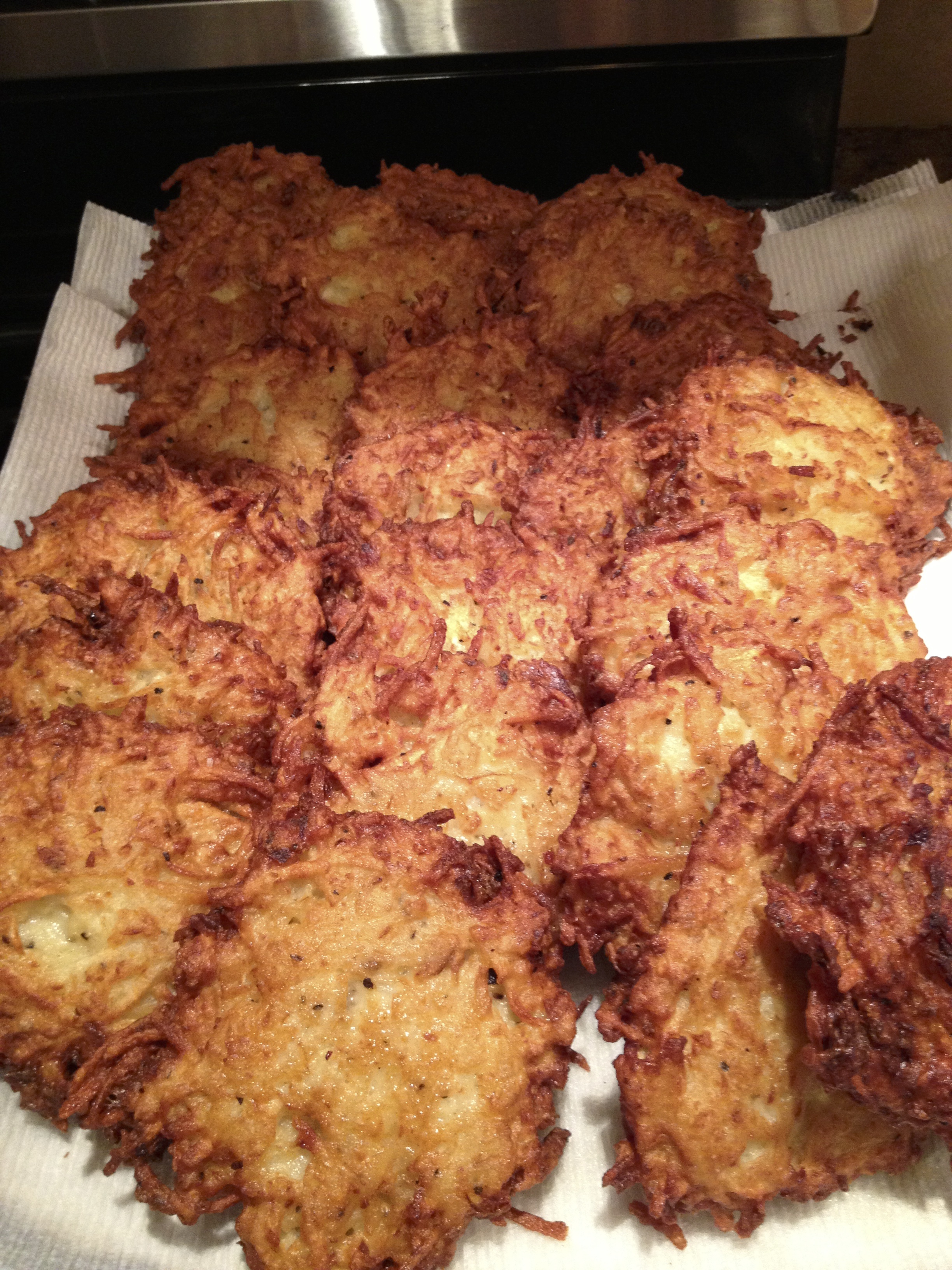Note: I first published this article for my first blog on January 11, 2014 less than one year after my dad passed away and on the day we would first be celebrating his favorite holiday without him.
Since then, we've settled into our own routines for this day. My brother is in charge of preparing the sauerbraten the week before, my mom responsible for shopping while I take on the day of cooking and getting everything on the table (while still relatively hot). My uncles are still the gingersnap gravy making masters and me, my brother and sister all help make the latkes the night before the big celebration. Even our significant others, neither of whom had the chance to know our father, have been initiated into the latke making tradition.
Tomorrow we will all gather again for another delicious meal and even years after losing my dad, we are set to have a record number of guests around the table this year. The tradition has evolved but at its core will always be the heart, love and good food my father and grandmother wanted to share.
And that is what food is all about. Food isn't only about calories or nutrients, it's about family, bringing people together and a way to preserve a moment in time. It's about making memories, remembering loved ones and connecting to those you may never even have met.
In today's culture it can be easy to see how emotional eating is not beneficial but I tend to disagree. Yes, food should fuel you physically and mentally but it also should fuel your soul.
After loosing a loved one, many would consider holidays such as Christmas and Thanksgiving as the most difficult to endure. While this past holiday season was certainly not easy after losing my Dad last Spring, it’s a lesser known family holiday tradition that will truly be a test of emotional strength and serve as a marker for life “after Dad”.
Moving out to Long Island from Queens in the late 1940s, my father’s family went from a bustling city life to sprawling countryside leaving behind the close knit neighborhoods and culturally diverse shops, stores and ways of life.
My grandmother, wanting to keep the family close while out on Long Island and wanting to preserve the German heritage of which both her and my grandfather descended from, decided to hold an annual get together every New Year’s Day which included all of the traditional German fare. Sauerbraten, kartoffelkloesse (potato dumplings), kartoffelpuffer (potato dumplings), rotkohl (sweet & sour red cabbage) and spatzle (egg noodles) were all part of the line-up that reminded the family of home. And of course, the meal wouldn’t be complete without the ubiquitous, albeit slightly peculiar German gravy made out of crumbled gingersnap cookies.
My grandparents, Robert & Ethel
My grandmother continued on with this meal every year on New Year’s Day, through 5 children, my dad being shipped off to the Vietnam war, her children getting married and many other monumental moments and changes in life, it was something constant that everyone could rely on. Over the years the guest list even expanded to include new family members, new friends and even loyal patrons to my Dad’s restaurant. He was so enamored with the family tradition, he made the most of having to open the doors on New Year’s Day by putting Sauerbraten on the menu that one day of the year and giving everyone a little taste of Germany.
Unfortunately my grandmother passed shortly after my parents married and I never had a chance to meet her or talk to her first hand about the meal and the tradition. However, my father being the oldest and the best cook in the family, he picked up the tradition as his own. Slowly but surely the yearly tradition began to gain steam with a brand new audience – my mother’s side of the family. Just imagine the melting pot soon assembling at my parent’s dining room table with my mom’s predominately Irish family mixed in with the Germans and even Albanians. It was clear though, no matter what your own family heritage and traditions were, everyone fell in love with “German Day”.
By the time my siblings and I showed up, German Day was just part of the norm. I can’t remember any year of my life not being kicked off on New Year’s Day with a house full of people, a roaring fire in the fireplace and copious amounts of meat and potatoes. While my Dad incorporated various German foods and dishes into our everyday diets (a favorite of his was Schinkenfleckerl comprised of egg noodles and leftover cubed ham cooked together with a beaten egg), we reserved the almighty sauerbraten for German Day and German Day only.
It wasn’t until six years ago that the tradition proved to be more than just a holiday and marked the beginning of a six year goodbye to our Dad. A few days after Christmas that year he went into the hospital and we learned that he would be there up until at least New Years Eve, if not longer. Realizing that our decades long tradition was in jeopardy, my brother, sister and I quickly gathered and began devising up a game plan as our mom wasn’t very sure the whole thing could be achieved.
Crispy potato latkes are basically large (and tastier) hash browns.
Being the oldest child and most interested in cooking at that time, I thought one day this tradition would be passed on to me but I never expected it to be this soon! I started to wonder if we could pull it off. I had been around this meal my entire life, had helped out every year with the cooking & preparation but yet nothing had ever been written down into a recipe and I began to panic. Failing at this would be a huge disappointment, mostly to myself.
Sauerbraten is viewed as the national dish of Germany. It literally translates to sour meat. Not necessarily appetizing, I know but trust me it is delicious. We let ours brine for about a week in a mixture of vinegar, red wine and pickling spices (peppercorns, chili flakes, mustard seeds, allspice, cloves, ginger and coriander). Think of it as a pungent, pickled pot roast which we then top with a sweet gravy made by crumbling gingersnap cookies into the remaining brine and pan drippings.
Despite all of the obstacles and difficulties we banded together and got to work. I would call my dad in the hospital if there was any question on what to do next but for the most part, the ingredients & steps, stored away for the past year, started to seep back into all of our minds. In a fit of madness I even decided to try my hand at a new tradition by making a German lebkuchen cake. All bets were off, we had to succeed.
A big plate of love. Sauerbraten, sweet & sour cabbage, red cabbage, spatzle, latke, creamed spinach, potato dumplings, baked cauliflower.
The big day arrived and in a twist of fate my dad came home that very New Year’s Day. Immediately he started to examine what we had been up to, making sure it was up to par and we began to really feel the pressure. It was one thing to impress my relatives – it was another to impress or even just please my Dad. While stubbornness is a long held stereotype of the Germans, in my Father’s case it was the truth. As proud as he was for us to continue on the tradition, you could sense his unwillingness to let go just yet.
The end of the night came and while still riddled with minor jabs and criticisms, my father turned to me and stated a simple, “great job” with his signature mustached grin and in that moment I had never felt more proud of myself and my family.
The next six years were a roller coaster for my family as my Dad’s illness progressed and we all began to accept the ultimate outcome, although unsure when it would happen. Many holidays, Christmases, Thanksgivings, Easters, even New Year Eves were spent in the hospital but no matter what, he was always well enough to come home for New Year’s Day. Little did we know last January when he made it home just in time that by May we would need to say our goodbyes for good in less than 5 months.
A few things have changed over the years, like moving the actual date to after New Year’s Day as to alleviate the pressure of traveling (and the pressure of the our New Year’s Eve hangover) and the potato “ball” jokes have evolved but we still have not written down the recipe for my Grandmother’s Sauerbraten. And we plan on keeping it that way. Remembering it this way, means never having to forget and always being able to transport to the time we spent together, especially the time spent in the kitchen.
So this year, the first year after he has passed, it seems only fitting we celebrate again, after a week which would have marked my Dad’s 67th birthday. My grandmother’s china is set on the table, the latkes have been perfectly browned and walking into the kitchen the overwhelm me with emotion of celebrations past.
We will celebrate today in honor of my Dad, a man who lived by the notion that you are made rich by the people you keep in your company, by enjoying good food (and drink) and making enough memories to fill an entire lifetime with endless stories. Because in the end, those memories are all you have to keep.
Happy German Day, Dad. We miss you.








